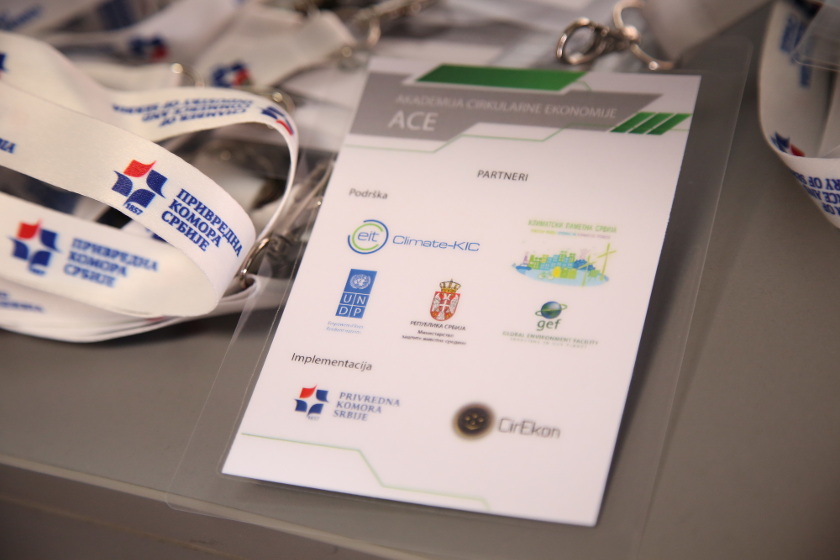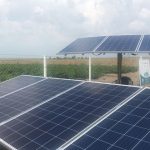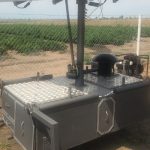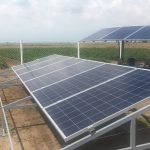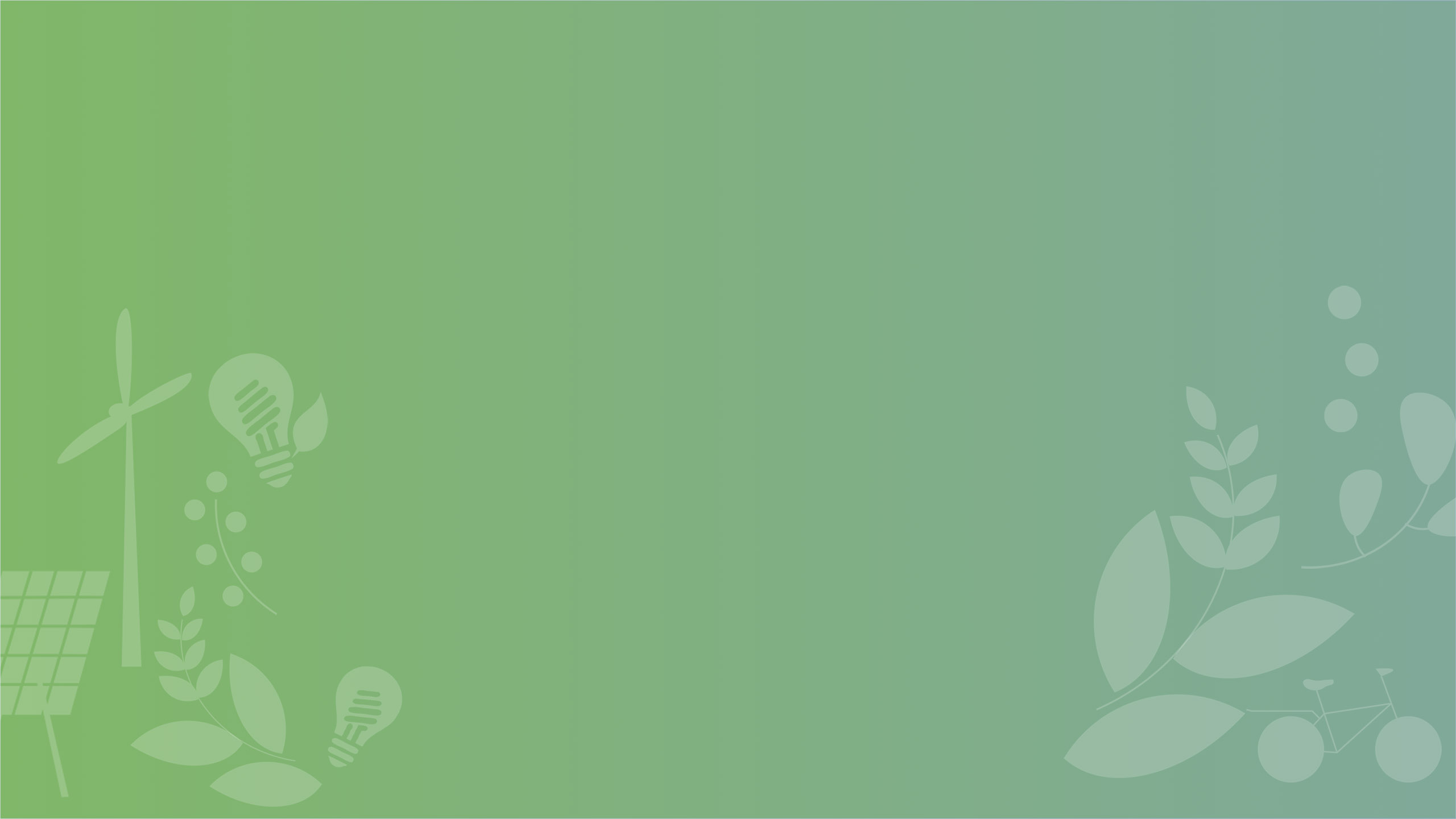-
Sep 18 2018 EUROPEAN MOBILITY WEEK
Belgrade, September 17th 2018. – Representatives of Belgrade’s Secretariat for Transport and the United Nations Development Programme have announced their planned activities following European Mobility Week.
Gordana Marković, Assistant to the Secretary for Transport of Belgrade, Žarko Petrović, Team Leader for resilient development of the United Nation Development Programme (UNDP), Paul-Henri Presset, Head of Communications of the EU delegation in Serbia and Ivan Karić, National Secretary of the Ministry of Environmental Protection, all spoke at the press conference.
European Mobility Week has been organized with the support of the European Commission’s Department for Mobility and Transport and has been marked all over Europe between September 16th and September 22nd, and ends with an event named “Car-Free Day”. The goal of the campaign is to encourage cities and municipalities to promote regulations for sustainable transportation systems and offer their citizens alternative means of transport. Each year the manifestation has been devoted to a specific cause in the area of sustainable mobility, and this year’s campaign and its slogan “Mix and move!” encourage using different means of transport.
“The Ministry of Environmental Protection has been actively participating in the pan-European Environment and Health process since 2009, and we have officially vowed to integrate the international declarations from Amsterdam and Paris into our legislation. This year, the Minister and his associates will be, in order to show how much we support this type of mobility, actively participating in Belgrade’s bicycle ride, and will encourage citizens to follow our example, which in turn helps the environment and our citizens’ health.”, said the National Secretary of the Ministry for Environmental Protection Ivan Karić.
“Our fellow citizens will have the opportunity to use new pedestrian zones and slow traffic zones in the city center in the following period, as well as new school zones, new bicycle lanes and bicycle parking spots”, said assistant to Belgrade’s Secretary for Transport Gordana Marković. “Having in mind that this year’s slogan is “Mix and Move!” we are using this chance to promote the “Park and Ride” system in Vladimir Popović street, which enables the free use of parking spots for car owners if they own a personalized “BusPlus” card with a valid monthly ticket and are registered in the Public Utility Company for Public Garages and Car Parks “Parking Servis”. On ”Car-Free Day”, we have organized a bicycle ride from Nikola Tesla Boulevard to Zemun’s pedestrian zone, as well as a pedestrian Saturday from Slavija Square to Republic Square. ” said Assistant to Belgrade’s Secretary for Transport Gordana Marković.
“The subject of this year’s European Mobility Week is multimodality, using the slogan “Mix and move!“ whose purpose is to encourage citizens to have an active role in sustainable transport. With small alterations in your daily routine, you can be healthier, live longer, save time and money and improve your environment for current and future generations. The European Union will continue to support the efforts of Serbia to improve multimodality in transport. For instance, just a few weeks ago, the new Žeželj Bridge , constructed using funds given by the EU, has been opened and allows the citizens of Novi Sad to commute on foot, by bike, car or train.“ Said Paul-Henri Presset, Head of Communications of the EU delegation in Serbia.
“The goal of the Climate Smart Urban Development Challenge project that we have been carrying out in cooperation with the Ministry for Environmental Protection and with the financial support of the Global Environment Facility (GEF) is including wider ranges of people in the planning and administration of ecologically smart and innovative solutions for lowering greenhouse gas emissions coming from key sectors, like transport”, said UNDP Serbia Team Leader for resilient development Žarko Petrović and added that “The project promotes sustainable mobility through the use of electrically powered vehicles, optimizing cycling networks using data from mobile devices, the introduction of solar-powered boats to transport people via the city’s rivers, or evading traffic jams using mobile applications. We are proud of the fact that we have been a part of the “Supporting sustainable transport in Belgrade” project that officially welcomed Belgrade to the European Mobility Week.”
-
Sep 10 2018 THE ACADEMY OF CIRCULAR ECONOMY INTRODUCED IN THE CHAMBER OF COMMERCE AND INDUSTRY OF SERBIA
The Chamber of Commerce and Industry of Serbia, in cooperation with Cirekon center and with the support of EIT Climate-KIC and UNDP Climate Smart Urban Development (CSUD) project, have introduced the Academy of Circular Economy. The Academy is meant for beginners from small and medium sized companies, with the goal of improving the quality and increasing the efficiency of the work process in their companies, directly contributing to the industrial progress of Serbia and environmental protection.
The advantages of circular economy are numerous: creating safe and sustainable industrial supply, lowering the growing import dependency of the country, creating new jobs, supporting innovation and increasing competition, saving funds, increasing the value of local resources, manufactured goods and services, etc.
In a large number of companies in Serbia, the system of producing and spending still uses the linear model “take-use/make-store”. Natural resources are being used to manufacture goods that will be thrown away at the end of their lifespan. This approach assumes an infinite availability of resources and infinite space for storing waste. The idea of “Circular Economy” has the goal of using and reusing resources, in order to decrease and put an end to the production of waste, which seeks thorough changes in the entirety of the chain of values within the industry.
The attendees will, with the help of practical tools, learn how to analyze and assess the effectiveness of the work process and use of resources in their company, and carry out changes in the direction of circular business. The Academy’s training allows acquiring not only theoretical knowledge, but also learning from the best current practices and achieved results.
“The Chamber of Commerce and Industry of Serbia has, with the introduction of the Academy of Circular Economy, entered the program of the transfer of knowledge, especially in the small and medium sized business sector, in order for that sector to prepare for an energy and ecology based transition, and all with the goal to strengthen the competitiveness in the regional and global market. We are thankful to all of our partners: the Cirekon center, EIT Climate-KIC and UNDP CSUD (Climate Smart Urban Development) project, we are thankful to the companies that have recognized the importance of this pilot project and we look at 2019 with a great amount of optimism, for when we are planning a new academy program” said Siniša Mitrović, advisor to the president of the Chamber of Commerce and Industry of Serbia.

“Circular economy is, in its essence, creating our own new investment cycle that plans to invest several billion euros in the area of waste management in the next couple of years. The direct benefits are the creation of new jobs, lowering the strain on the environment and switching to clean technologies by reusing resources that have, thus far, been stored in waste dumps. ” said Slobodan Perović, assistant to the Minister of Environmental Protection.
“Switching from the concept of waste management to the concept of circular economy is the path to economic growth” said Žarko Petrović, the UNDP Team Leader for Reslient Development. “With the introduction of circular economy, long term investments in resource and energy efficiency, the relacement of fossil fuels with renewable energy sources and lowering greenhouse gas emissions, we contribute to the realization of the global goal of sustainable development and fulfilment of our national duties that we took upon ourselves following the Paris Agreement“ added Petrović.
The Academy begins its work on September 7th 2018 in the spaces of the Chamber of Commerce and Industry of Belgrade, and the training will last one month. Classes will be held on Fridays and Saturdays, and the lecturers are domestic and international experts in the field of circular economy.
The Chamber for Commerce and Industry will, due to large public interest, include the program of circular economy in the regular program of the Chamber’s Business Academy.
In December 2015, the European Commission has adopted a new and ambitious set of circular economy regulations that relate to regulatory changes in the field of waste management and product design. The set of regulations includes four regulatory suggestions for the introduction of new goals in waste management that are related to the reuse, recycling and storage of waste.
A new framework for the improvement of material efficiency in production through the improvement of the eco-design directive is under its way, and will in itself incorporate the whole life cycle of products. The existing eco-design directive will be supplemented with regulations that extend the life span of products, increase the possibility of the reuse of components and recycled materials and encourage the use of recycled components in products.
-
Competition of the Ministry of Environmental Protection for the Green Fun
The open competition of the Ministry of Environmental Protection for the Green Fund granting of funds through encouraging educational, analytic and developmental studies and projects will last until September 14th 2018.
The goal of the competition is the development and protection of the environment through supporting studies and projects in the areas of education, development and research, in agreement with the goals defined in Serbia’s strategic documents. Requests for the granting of funds may also be submitted for the co-financing of phases in projects or studies lasting multiple years. The expected beginning of the chosen studies or projects is mid October 2018.
Only establishments that are in the Science-Research Organization Registry have the right to submit requests, and the total available funds for the realization of the competition amount to 50 million dinars. Those who submit requests may achieve the right to the usage of funds, with the maximum being five million dinars and the minimum being 500 thousand dinars per project.
-
Aug 27 2018 THE MOST IMPORTANT SPANISH MEDIA REPORT ON SERBIAN INNOVATIVE CLIMATE SMART URBAN DEVELOPMENT IDEA
The first photobioreactor, the aquarium of modern design with microalgae, will be installed in the next few months in the city of Smederevo, report the most influential Spanish media. The use of microalgae to capture carbon dioxide and release the oxygen is already evolving in Europe, said Dr Ivan Spasojevic from the Institute for Multidisciplinary Research in Belgrade. “However, this concept of a reduced photobioreactor and its installation in an urban environment does not exist, we have invent it,” says Spasojević, a doctor of biophysics, who leads a group of nine researchers, scientists from the Institute.
The device, called LIQUID3, with a base of only three square meters, replaces the lawn of 400 square meters or two trees that were grown for the production of oxygen. “For maturity of trees it takes 20 years, and our device is set in three or four hours,” says Spasojević. The task of the urban photobioreactor is to counter the great release of carbon dioxide in urban centers, which often do not have enough plants and greenery.
For this reason, this invention is ideal for high pollution areas, traffic routes, proximity to thermal power plants, industrial plants or densely populated areas. The price of the prototype is approximately 3,000 or 4,000 euros, however it has not yet been produced in the series. The system functions as a water reservoir with microalgae that absorbs carbon dioxide through photosynthesis and releases oxygen. “This is not a substitute for parks, but compensation for places where they are not possible. This is the answer for areas where trees can not be planted,” says Spasojević.
Dr Dusica Stojiljkovic, member of the research team, says the device is self-sustainable and it creates a biomass that can be used or sold as a quality fertilizer.
In late April 2018, this innovative idea was awarded by the project “Climate Smart Urban Development Challenge” jointly implemented by the Ministry of Environmental Protection and the United Nations Development Program (UNDP) with the financial support of the Global Environment Facility (GEF).
-
Aug 16 2018 ROBOTICS OF SERVICE TO THE AGRiCULTURE AWARD WINNERS “PIONEER IN INNOVATION” IMPLEMENT THEIR IDEA IN PRACTICE
An innovative project idea, awarded within the Climate Smart Urban Development Challenge (CSUD) initiative, began its life in the Srem County, north Serbia.
Until recently, a farmer from Belegish village, Nikola Loncar, used a diesel generator for watering 65,000 seedlings on a 10,000-hectare plot, which means he came two to three times a day to water his crops, which could last up to 10 hours a day. At the annual level, this work was valued at a thousand euros per hectare.
Today, with the help of the Center for Robotics of the Institute “Mihajlo Pupin” from Belgrade, which tests the smart use of natural resources on his agricultural estate, Nikola Loncar remotely controls irrigation through the Android application on his mobile phone.
It is a unique and innovative system of optimal land, water and energy management, which completely replaces the use of fossil fuels with renewable energy sources (solar energy and wind power) and contributes to the reduction of greenhouse gas (GHG) emissions.
The core elements of this device are a modern robotized solar generator and a soil moisture sensor, integrated into a climate-smart system for remote management of land and other natural resources. This approach allows the farmer to produce healthier food, because the additives for soil are used only as much as the land needs, or – as the science says. The “Mihajlo Pupin” Institute plans to organize workshops for farmers and entrepreneurs who wish to introduce this innovative system into their agricultural holdings.
The project idea itself was selected as one of the 111 received applications at the CSUD’s Public Call for innovative and climate-smart solutions”, while the Institute “Mihajlo Pupin” is one of the 25 winners of the Call, proclaimed the “Climate Smart Innovation Pioneer”. UNDP implements the CSUD in partnership with the Ministry of Environmental Protection and with the support of the Global Environment Facility (GEF).


